To date, Iran has violated the 2015 nuclear deal limits on uranium enrichment, but has not enriched above the 5% level.
YONAH JEREMY BOB

Iran’s recent rumblings about developing a nuclear submarine are a cover for its desire to start enriching uranium at higher levels, former Mossad official Sima Shine said on Monday.
Speaking as part of a videoconference organized by the Institute for National Security Studies (INSS), where she is currently a lead expert on Iran, she noted that the Islamic Republic has mentioned the possibility of developing a nuclear submarine before.
However, enriching uranium to higher levels could bring Supreme leader Ayatollah Ali Khamenei significantly closer to a nuclear weapon.
To date, Iran has violated the 2015 nuclear deal limits on uranium enrichment, but has not enriched above the 5% level. The 20%, 60% and eventually 90% levels must be crossed before the uranium can be weaponized.
Enriching to the 20% level might already trigger greater threats from the US and Israel.
Shine explained that the engine of a nuclear-powered submarine “needs higher enrichment levels [of uranium] and very few [world] powers can do it. But they are paving the way to provide civilian-use justifications for why they would need to increase their enrichment levels.”
In other words, she suggested that even if Tehran failed to develop a nuclear submarine – expertise which may be beyond its reach – it could use the possibility of trying to develop one as a legal basis for enriching uranium to high levels.
In this scenario, Iran could try to convince the IAEA and the EU that it was not seeking a nuclear weapon and could therefore try to get them to pressure Israel and the US to tolerate the nuclear advancement.
Former IDF chief-of-staff and INSS fellow Gadi Eisenkot also spoke, noting that Iran has been hit hard by the coronavirus crisis in all of its efforts to assert regional hegemony and to develop its nuclear weapons program.
Eisenkot especially pointed to a reduction of Tehran’s influence over Gaza due to an increasingly squeezed economy, forcing it to limit how much financial support it can grant terror groups there.
The former IDF chief said this could offer an opening to Israel and the US to encourage moderate Sunni Arab states to be more involved in the Gaza situation and to help strengthen any more moderate elements there.
FORMER IDF intelligence chief and current INSS Executive Director Amos Yadlin said that the Islamic Republic had not changed its major long-term strategic goals during the corona crisis, but had shifted its short-term tactics.
He described Iranian efforts to achieve a nuclear weapon and regional hegemony as being ongoing, but said that in the short term, while enduring extreme economic and other damage courtesy of the coronavirus, those efforts have temporarily been slowed.
In particular, he noted that Tehran has slowed its efforts to make trouble in Syria and Lebanon, though he warned that the mullahs were likely on the lookout for unexpected openings to shake things up going forward.
INSS Iran expert Raz Zimmt said that the regime might surprisingly come out stronger even as the country was generally weakened by corona in the short term.
He said that the Islamic Revolutionary Guards Corps and the Basij militia had wisely been deployed in massive numbers to open field hospitals and distribute masks and other necessities across the country.
This could mute criticism of the IRGC and the Basij for oppressing and killing protesters during a wild 2019.
Zimmt said that the regime was also secure from being toppled because Iran’s middle class was much too concerned about their physical and economic health to risk destabilizing the country by joining in on any near future protest movement. This was especially true since large protests could increase the risk of being infected with the coronavirus.
Shine concurred with Zimmt that the regime was in no danger of falling even as the corona crisis is one of its low moments.
Tel Aviv University Iran expert Dr. Leora Hendelman-Baavur discussed some contrary trends regarding Iran-Chinese relations.
On the one hand, she stated that many Iranians had criticized the regime for giving China two million masks earlier on in the corona crisis and then running out of masks for its own citizens once the virus hit Iran.
Similarly, Iranian health officials slammed China for underplaying the virus and concealing the true scope of infections that it faced in a way that harmed other countries’ perception of the threat, she said.
On the flip side, Hendelman-Baavur said that Iran’s Foreign Ministry had counterattacked its own health officials for criticizing China, saying that they were operating like American or Israeli spies.
Furthermore, even after some Iranian officials said flights to China would be stopped, certain flights continued – which health experts think may have worsened the outbreak in the Islamic Republic.
Finally, INSS associate Tomer Fadlon presented economic data showing that China is the main country keeping Iran afloat, receiving almost 23% of its oil exports and also being its leading importer.
Other countries that were mentioned as having large oil exports or major imports were Iraq, the UAE, India, Afghanistan and Germany.
Content retrieved from: https://www.jpost.com/middle-east/iran-news/ex-mossad-official-iran-nuke-submarine-idea-cover-for-uranium-enrichment-625246?fbclid=IwAR1dteoDIK609gVfMOWjHnSNbTObdY4wUFVcpZ-otIOi_MgaWi8vaMUB11U.